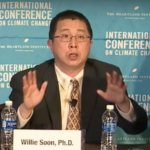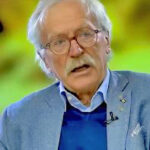In Nature van afgelopen donderdag een interessant essay van Daniel Sarewitz. Het is sowieso een verademing om een stuk in Nature te lezen dat nou eens niet acht keer de term klimaatontkenners gebruikt. Sarewitz stelt dat door climategate en de fouten in het IPCC-rapport het klimaatonderzoek flink in de verdediging gedreven is. Wat is nu precies het probleem?
The problem? Science has been called on to do something beyond its purview: not just improve people’s understanding of the world, but compel people to act in a particular way. For nearly twenty years, researchers, policy-makers and activists have claimed that climate science requires a global policy agenda of top-down, United-Nations-sponsored international agreements; targets and timetables for emissions reductions; and the creation of carbon markets. But this agenda was guaranteed to be politically divisive because it entails short-term political and economic costs in return for benefits that are long term and highly uncertain.
In de vetgedrukte zin staat de kern van zijn betoog. De klimaatwetenschap is ingezet als belangrijkste wapen om politici en burgers ervan te overtuigen dat er bepaalde maatregelen genomen moeten worden. Voorstanders van klimaatbeleid waren naïef te denken dat als de wetenschap nou maar steeds meer zekerheid zou bieden, dat effectief beleid van vanzelf wel zou komen. Toen dat niet gebeurde werd de toon van de broeikasaanhangers steeds hysterischer:
But supporters of the climate policy regime have long advanced an equally naive and idealized version of how the vaunted scientific consensus on anthropogenic warming demanded action consistent with their ideological preferences. To keep political opposition at bay, they counted on science to deliver progressively greater certainty about the reality and consequences of climate change, an approach embodied in former US vice-president Al Gore’s movie An Inconvenient Truth. With international negotiations making little progress in reducing greenhouse-gas emissions, climate rhetoric took on an increasingly insistent and hysterical tone, as when climate scientist James Hansen, invoking images of Nazi atrocities, wrote that “trains carrying coal to power plants are death trains” (Guardian, 15 February 2009).
IPCC systematisch fout
De fouten in het IPCC-rapport zijn geen volgens Sarewitz geen ‘foutjes’ zoals de 53 Nederlandse hoogleraren in een open brief nog meldden, maar er is sprake van systematische fouten:
One can hardly imagine that equally bad data tending in the other direction — for example, saying that the glaciers were not retreating — would have made it into the report. To those who already distrust climate science because it is used to justify action that they deem ideologically repugnant, such revelations make it look as though the science is systematically, if not congenitally, biased in one direction.
Maar IPCC helemaal zuiveren is nog steeds geen garantie voor een effectiever klimaatbeleid. Daarvoor moet je niet in de wetenschap zijn, maar in de politiek!
The crucial point here is that no amount of reform of the IPCC, or rooting out of bad science — or of scientists behaving badly — will begin to correct the flaws in the dominant approach to climate policy. Rehabilitation of climate policy is a matter not of getting the science right, but of getting the politics right.
Hoe moet het dan wel? Korte termijn kosten moeten volgens hem ook op korte termijn iets opleveren. Beleid dat om zware offers vraagt van de samenleving zullen het niet redden:
Both paths also allow climate change to be understood not as impending doom that requires deep sacrifice to ensure survival, but as an opportunity to continually improve society.






En daar komt de CO2-tax van de EU, direct op de deurmat:
http://www.climategate.com/eu-plans-first-federal…
"Both paths also allow climate change to be understood not as impending doom that requires deep sacrifice to ensure survival, but as an opportunity to continually improve society."
En daarbij wordt bedoeld, zo begrijp ik, lange termijn investeringen voor het grote goed, en directe investeringen voor verbeteringen op korte termijn.
Maar wat moet je hiervan vinden als vd Hoeven 45 miljoen geeft aan indonesie voor onderzoek naar aardwarmte? Dat land barst van de olie, 45 miljoen is minder dan wat een oliekraker kost.
Tientallen miljarden gaan daar per jaar op aan corruptie, en dan moet nederland dáár ontwikkelingen stimuleren?!
Compleet van de pot gerukt.